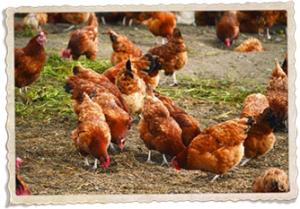For every person who raises backyard chickens, they will inevitably have to ask themselves the big question: should you or shouldn’t you feed your chickens probiotics? While some people hesitate, probiotics can be extremely beneficial to your chickens. This is especially the case if you’re raising your chickens for meat.
Nevertheless, it’s always a good idea to learn everything you can about probiotics before incorporating them into your chickens’ diets. Here we explain everything you need to know about probiotics and your chickens:
What are probiotics?
Probiotics are essentially living bacteria. They’re not the bad kinds of bacteria that cause illnesses and diseases; instead, they’re the good kind that help to keep our guts and our digestive system healthy. This is true for humans as well as chickens. Back in the 1970s, several scientific studies and trials proved that with the appropriate combination of probiotics, chickens could experience significant growth. It is for this reason why many chickens raised for meat are fed probiotics.
Why do my chickens need probiotics?
As we said before, not all kinds of bacteria are bad. There are the harmful kinds that can hurt our health, but there are also the good kinds that can help support our bodily functions. Probiotics support digestive health—a critical factor for keeping your flock healthy. With a healthy digestive system, chickens will experience increased nutrient absorption, decreased diarrhea, increased cleanliness, increased egg production and egg quality, and more. Plus, by feeding your flock probiotics, there is a smaller likelihood that the bad kinds of bacteria (such as E. coli, Salmonella, and Clostridium) will grow inside the digestive system. Essentially, when a chicken’s digestive system if full of probiotics, there is less room for more harmful kinds of bacteria to grow.
What kinds of probiotics should I feed my chickens?
There are several kinds of probiotics that you can give your chickens. About 70 percent of the bacteria in a chicken’s gut belong to the Lactobacillus strain. As such, finding feed with the Lactobacillus label is usually a safe bet. However, there are also a couple other probiotics you can feed your chickens.
Here are the four most common probiotics that you should look for in your chickens’ feed:
- Lactobacillus acidophilus: These kinds of probiotics help to ferment carbohydrates. They also help support growth and reduce the effects of more harmful bacteria that can grow inside of your chicken’s digestive tract.
- Lactobacillus casei: Similar to acidophilus, these kinds of probiotics can ferment carbohydrates. They can also reduce the number of harmful bacteria that grow inside a digestive tract and reduce their impact.
- Bifidobacterium thermophilum: While not a part of the Lactobacillus strain, thermophilum are nevertheless a beneficial strain of probiotic. They help to ferment carbohydrates and they can also benefit the immune system.
- Enterococcus faecium: Also not a part of the Lactobacillus strain, faecium have similar effects as the other three kinds of probiotics. Namely, they can reduce the impact of harmful bacteria and help ferment carbohydrates.
If you have further questions about incorporating probiotics into your chickens’ diets, or any other questions about raising backyard chickens, feel free to contact Chickens for Backyards today!

